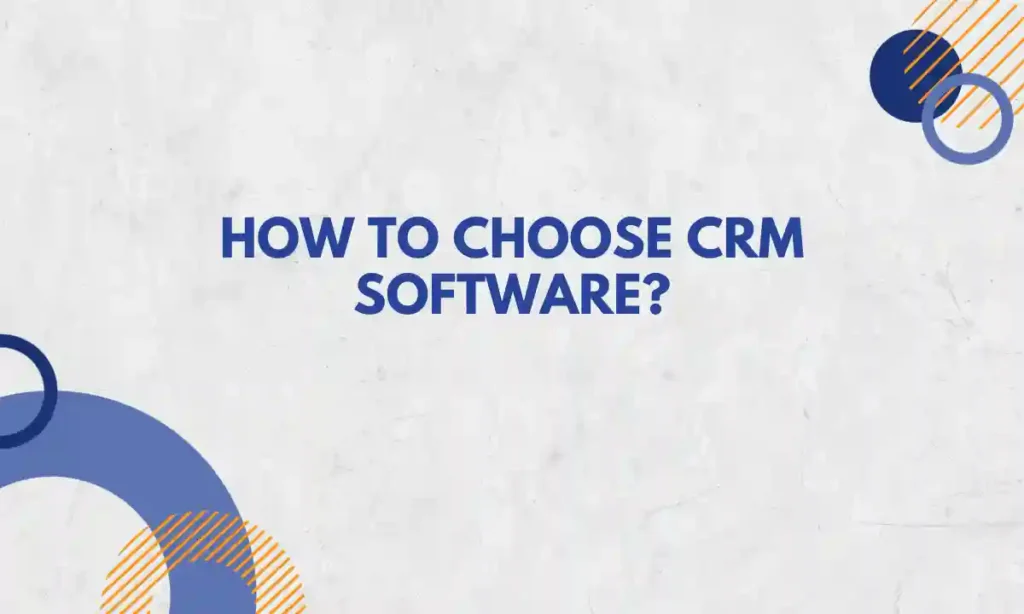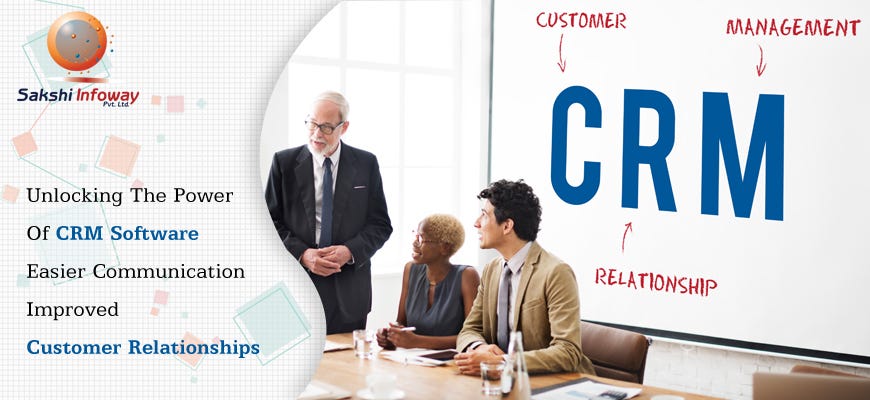To choose CRM software, consider the specific needs of your business and evaluate the features, integration capabilities, pricing, and user-friendliness of different options available. A well-suited CRM software can streamline your customer relationship management activities and enhance your business efficiency, sales, and customer satisfaction.
Whether you are a small startup or a large enterprise, selecting the right CRM software is crucial for optimizing your business operations and improving customer experiences. CRM software, or Customer Relationship Management software, is a powerful tool that helps businesses manage their interactions and relationships with customers.
It allows companies to store and organize customer data, track sales leads, manage customer service requests, and analyze customer behaviour. Choosing the right CRM software is essential for maximizing the benefits it can bring to your business. There are several factors to consider when selecting CRM software. First, identify the specific needs of your business. Determine what features and functionalities you require to effectively manage your customer relationships. For example, if you need to track sales leads, then look for CRM software with robust lead-tracking features. Next, consider the integration capabilities of the CRM software. It should be compatible with your existing software and systems, such as your email client or marketing automation platform. Seamless integration ensures smooth data transfer and eliminates the need for manual data entry. Pricing is another crucial aspect to evaluate. Consider your budget and compare the pricing models of different CRM vendors. Some CRM software providers offer tiered pricing plans based on the number of users or features included. Choose a pricing plan that aligns with your budget and offers the necessary features for your business. User-friendliness is also important. The CRM software should be intuitive and easy to navigate for you and your team. Look for a clean and intuitive interface and consider any training or support resources offered by the CRM vendor. Choosing the right CRM software requires careful consideration of your business needs, integration capabilities, pricing, and user-friendliness. By evaluating these factors, you can find a CRM solution that will improve your customer relationship management processes and drive business growth.
Understanding CRM Software
CRM software, short for Customer Relationship Management software, is an essential tool for businesses looking to manage their customer interactions effectively. It allows companies to organize and analyze customer data, track sales, and nurture customer relationships.
CRM software is important for businesses as it helps improve customer satisfaction and retention, increase sales productivity, and streamline marketing efforts. By centralizing customer data, businesses can gain a holistic view of their customers and provide personalized experiences.
The benefits of using CRM software are manifold. It enables businesses to track customer interactions, identify sales opportunities, and align sales and marketing efforts. CRM software also helps automate manual tasks, improve team collaboration, and provide valuable insights through data analytics.
In conclusion, choosing the right CRM software is crucial for businesses looking to enhance customer relationships and boost their overall performance. With the right software in place, companies can streamline their operations, improve customer satisfaction, and drive sustainable growth.
Factors To Consider Before Choosing CRM Software
Choosing the right CRM software for your business requires careful consideration of several factors.
First and foremost, you need to identify your business needs and goals. This will help you determine the features and functionality that are essential for your CRM software.
Scalability and flexibility are also important factors to consider. You want a CRM solution that can grow with your business and adapt to your changing needs.
A user-friendly interface is crucial for ensuring that your employees can easily navigate and utilize the CRM software. Intuitive design and ease of use contribute to increased productivity.
Integration capabilities with other tools are essential for streamlining your business processes. Look for CRM software that can seamlessly integrate with your existing systems.
Having mobile access and compatibility enables your team to access important CRM data on the go, which is particularly useful for sales professionals and remote teams.
Pricing and budget considerations play a significant role in choosing CRM software. Make sure to evaluate the cost in relation to the features and benefits it provides.
Customization options are important for tailoring the CRM software to fit your specific business requirements. Look for a solution that allows you to customize fields, workflows, and reporting.
Data security and privacy are of utmost importance, especially when dealing with sensitive customer information. Ensure that the CRM software has robust security measures in place.
Lastly, consider the level of customer support and training provided. Good support and training resources can make a significant difference in how effectively you can utilize your CRM software.
Read more: How to Make Crm Software in Php?
Evaluating CRM Software Options
Researching available CRM software is an essential step in choosing the right one for your business. This involves comparing features and functionalities, reading user reviews and ratings, as well as analyzing case studies and success stories.
When researching CRM software options, it’s important to consider the specific needs and requirements of your organization. Look for features that align with your business goals and objectives, such as contact management, lead tracking, sales forecasting, and customer service tools.
Reading user reviews and ratings can provide valuable insights into the effectiveness and usability of different CRM software. Pay attention to feedback about the user interface, customer support, and overall satisfaction.
Additionally, analyzing case studies and success stories can give you a sense of how CRM software has benefited other businesses similar to yours. Look for examples of how the software has improved sales and marketing efforts, enhanced customer relationships, and increased overall productivity.
In conclusion, when evaluating CRM software options, it is vital to thoroughly research available options by comparing features, reading reviews, and analyzing case studies. This will help you make an informed decision and choose CRM software that best meets the needs of your business.
Key Features To Look For In CRM Software
When choosing CRM software for your business, it is important to consider key features that will enhance your contact and lead management. Look for software that provides a user-friendly interface to easily store and access customer information. Additionally, **sales and pipeline tracking** capabilities are crucial for monitoring your team’s progress and forecasting revenue. Reporting and analytics features allow you to gain valuable insights into your sales performance and make data-driven decisions. **Marketing automation** tools help streamline your marketing efforts and ensure consistent communication with your customers. **Customer service and support** tools are essential for providing excellent post-sale interactions. Integration with email and social media platforms allows for seamless communication and engagement with your customers. **Workflow automation** is important to streamline processes and increase efficiency. Lastly, look for CRM software that offers customization options to tailor the system to your business needs.
Questions To Ask CRM Software Providers
Is the software cloud-based or on-premise?
When choosing CRM software, it’s crucial to consider whether the software is cloud-based or on-premise. Cloud-based CRM software offers numerous advantages, such as easy accessibility from anywhere with an internet connection and automatic updates. On the other hand, on-premise CRM software requires infrastructure and maintenance costs but provides better control over data security. It’s important to evaluate your business requirements and IT capabilities to determine which option aligns best with your needs.
What is the implementation process like?
Understanding the implementation process is essential before selecting a CRM software provider. You should inquire about the steps involved, such as data mapping, configuration, and integration with existing systems. Additionally, ask about the estimated timeline for implementation as well as any potential disruptions that may occur during the transition.
Can the software be customized to fit my business needs?
Customizability is a significant factor when choosing CRM software. Every business has unique requirements, so it’s essential to ensure that the software can be tailored to meet your specific needs. Inquire about the flexibility of the software in terms of modifying fields, workflows, and interface elements to align with your business processes.
How is data migration handled during the transition?
Data migration is a crucial aspect of implementing a new CRM software system. It’s important to ask about the process of transferring existing data from your current system to the new CRM software. Inquire about any potential data loss, data cleansing, and integration challenges that may arise during the migration process. Understanding how this is handled will help you avoid any potential disruptions or data integrity issues.
What kind of training and support is provided?
Receiving proper training and ongoing support is essential for successfully using CRM software. Inquire about the availability of training resources, such as documentation, tutorials, and webinars. Additionally, ask about the level of customer support provided, including response time for inquiries and assistance with technical issues. Adequate training and support will ensure your team can effectively utilize the CRM software.
Are there any additional costs or hidden fees?
It’s crucial to have a clear understanding of the costs associated with CRM software. Inquire about any additional fees or hidden costs beyond the initial licensing or subscription fee. This includes costs for customization, integration with other systems, ongoing support, and potential upgrades. Having a transparent view of the total cost of ownership will help you make an informed decision when choosing CRM software.
Making The Final Decision
When choosing CRM software, making the final decision can feel overwhelming. However, by following a few key steps, you can narrow down your options and make a well-informed choice that fits your business needs. Consulting with your team and stakeholders is crucial, as their input can provide valuable insights and help align the software with your specific requirements.
Another effective way to evaluate CRM software is to take advantage of free trials and demos. This allows you to test the functionality, interface, and overall user experience before committing to a purchase. Additionally, it’s important to consider the long-term scalability and growth potential of the software. Ensuring that the CRM can accommodate your business’s future needs will save you from having to switch platforms in the future.
Ultimately, by carefully considering these factors and involving key stakeholders in the decision-making process, you can confidently select CRM software that will streamline your operations and drive your business forward.
Implementing And Onboarding CRM software
Implementing and onboarding CRM software is a crucial process for any business. To ensure a successful implementation, developing an implementation plan is essential. This plan should include customizing the software to fit your business needs, as this will maximize its efficiency and effectiveness. Additionally, migrating data from previous systems is important to ensure a smooth transition and access to important historical information.
Once the software is set up, training your team on how to use CRM software is vital. This ensures that all team members understand how to navigate the system and utilize its features to their full potential. Addressing any initial challenges or issues that arise during the onboarding process is also important to prevent any delays or disruptions. By following these steps, you can choose and implement CRM software that will enhance your business operations and improve customer relationships.

Credit: www.uschamber.com
Frequently Asked Questions On How To Choose CRM Software?
How Do I Choose The Right CRM Software For My Business?
Choosing the right CRM software for your business involves considering your specific needs, budget, scalability, integration capabilities, and user-friendliness. Analyze the features, customization options, and customer support offered by different CRM providers to make an informed decision that aligns with your business goals and requirements.
What Are The Essential Features I Should Look For In CRM software?
When choosing CRM software, look for features like contact management, lead tracking, sales forecasting, email automation, task management, reporting, and integration options. These features can help streamline your sales process, improve customer communication, enhance team collaboration, and provide valuable insights for effective decision-making.
Can CRM Software Integrate With Other Business Tools And Systems?
Yes, CRM software can integrate with other business tools and systems like email marketing platforms, customer support software, accounting software, and e-commerce platforms. Integration allows for seamless data flow and eliminates the need for manual data entry, resulting in improved productivity, efficiency, and better customer experience.
Conclusion
To sum up, selecting the right CRM software for your business is a crucial decision that can greatly impact your company’s success. By considering your specific needs and goals, evaluating features and functionalities, researching customer reviews, and accounting for cost and scalability, you can make an informed decision.
Remember, your CRM software should not only streamline your processes but also enhance customer relationships and drive growth. Choose wisely and watch your business thrive.




